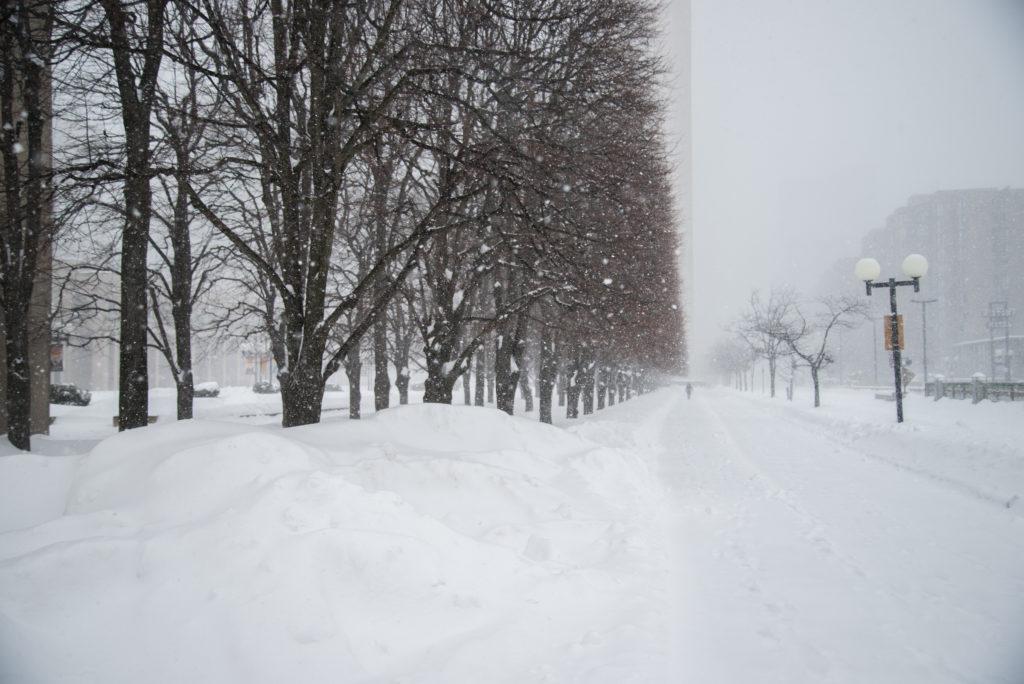By Jose Castillo, news correspondent
Friday, Jan. 30 marked the third time attorneys defending 21-year-old Boston Marathon Bombing suspect Dzhokar Tsarnaev have attempted to move the federal trial out of Boston, fearing that the search for an unbiased jury will prove futile as the pool of potential jurors has been selected and interviewed in the same city in which the bombings took place.
This plea, along with others before it, echoes problems the defense has seen with this case since it started one month ago. Not only have Tsarnaev’s attorneys seen issues in Judge George O’Toole, Jr.’s juror selection process, but they are also concerned with the overall speed of the case. The defense has stated that the trial process is moving at an alarmingly fast rate. However, the recent blizzards that hit much of New England allowed the defense an opportunity to catch their breath.
Accumulation of over 40 inches of snow in the past two weeks led O’Toole to cancel juror interviews four times, once last week on Tuesday and Wednesday and again on Monday and Tuesday of this week.
Despite cancellations, O’Toole said that he is satisfied with the speed of the selection process. However, his original projected trial start date of Jan. 26 has now expired. Additionally, O’Toole has lessened his previous goal of meeting 40 jurors a day to only 20. He has also chosen to review a juror’s questionnaire filled out in the primary round of selection conducted three weeks ago instead of holding an interview for each juror.
Last week, court official Ginny Hurley told press that selection was occurring at a steady pace, “but in the interest of thoroughness is taking longer than originally anticipated.”
The process of filtering out potential jurors who have obvious biases, called voir dire, will continue until O’Toole has selected around 70 potential jurors. After the 70 have been chosen, both the prosecution and the defense will have opportunities to dismiss potential candidates until only 18 remain, 12 to sit in on the trial and eight to serve as alternatives.
While jury selection moves forward, the defense continues its pleas to move the trial elsewhere. Friday’s plea cited media coverage of the Tsarnaev case, stating that the Boston news has been oversaturated with stories related to the Boston Marathon Bombing. The attorneys argue that the extensive coverage makes finding an impartial jury almost impossible.
One interesting case the defense included in their plea was coverage of a local man who shoveled snow off the Boston Marathon finish line on Boylston Street on Jan. 28 during last week’s blizzard, saying he was “no hero… just a nut who loves the marathon.” The defense believes that these stories indicate the strong emotion still felt by the city nearly two years after the events of April 15, 2013.
The interviews being conducted, along with the answers provided through questionnaires, have also proved to be a testament to the defense’s plea. Ninety-four percent of potential jurors stated that they have experienced “moderate” to “heavy” exposure of the Tsarnaev case through media outlets, and an additional 68 percent stated they feel Tsarnaev is guilty.
Interviews that began two weeks ago revealed many connections between the bombings and those selected to potentially sentence Tsarnaev to death. Many chosen to speak with O’Toole knew friends, family members and neighbors who had been affected by the bombings.
“Stronger support for a finding of presumed prejudice in Boston is difficult to imagine, and the existing record precludes a fair trial in Boston,” stated the defense in its appeal to O’Toole.
O’Toole has stated jury selection should end by next week and the trial will take about three months.
Tsarnaev and his brother Tamerlan, now deceased, are the primary suspects in the dual bombings of the 2013 Boston Marathon, which left three dead and 260 others injured. Tsarnaev faces 30 charges, 17 of which carry the death penalty.
Photo by Scotty Schenck









